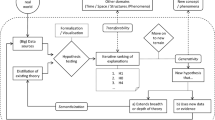Abstract
Intuitive conceptions guide practice, but practice reciprocally reshapes intuition. The intuitive conception of intelligence in AI was originally highly anthropocentric. However, the internal dynamics of AI research have resulted in a divergence from anthropocentric concerns. In particular, the increasing emphasis on commonsense knowledge and peripheral intelligence (perception and movement) in effect constitutes an incipient reorientation of intuitions about the nature of intelligence in a non-anthropocentric direction. I argue that this conceptual shift undermines Joseph Weizenbaum's claim that the project of artificial intelligence is inherently dehumanizing.
Similar content being viewed by others
References
BarrAvron and FeigenbaumEdward (1981), The Handbook of Artificial Intelligence, Vol. I, Los Altos, CA: William Kaufmann, Inc.
BodenMargaret (1977), Artificial Intelligence and Natural Man, New York, NY: Basic Books.
BodenMargaret (1984), ‘Animal Perception from an Artificial Intelligence Viewpoint’, in ChristopherHookway, ed., Minds, Machines and Evolution: Philosophical Studies, Cambridge, UK: Cambridge University Press.
BradyJ. M. (1984), ‘The Social Implications of AI’, in MasoudYazdani and AjitNarayanan, eds., Artificial Intelligence: Human Effects, Chichester, UK: Ellis Horwood.
Brooks, Rodney A. (1986), ‘Achieving Artificial Intelligence Through Building Robots’, MIT AI Memo 899.
CharniakEugene and McDermottDrew (1985), Introduction to Artificial Intelligence, Reading, MA: Addison-Wesley Publishing Company.
GouldStephen Jay (1981), The Mismeasure of Man, New York, NY: W. W. Norton & Company.
HayesPatrick J. (1979), ‘The Naive Physics Manifesto’, in DonaldMichie, ed., Expert Systems in the Micro-electronic Age, Edinburgh: Edinburgh University Press.
HurlbertAnya and PoggioTomaso (1988), ‘Making Machines (and Artificial Intelligence) See’, Daedalus 117, No. 1 (Winter 1988), pp. 213–239.
MinskyMarvin, ed. (1968), Semantic Information Processing, Cambridge, MA: The MIT Press.
MinskyMarvin (1975), ‘A Framework for Representing Knowledge’, in PatrickWinston, ed., The Psychology of Computer Vision, New York, NY: McGraw-Hill.
MinskyMarvin and PapertSeymour (1968), Perceptrons, Cambridge, MA: The MIT Press.
MoravecHans P. (1984), ‘Locomotion, Vision, and Intelligence’, in MichaelBrady and RichardPaul, eds., Robotics Research, Cambridge, MA: The MIT Press.
RolstonHolmes (1988), Environmental Ethics, Philadelphia, PA: Temple University Press.
SchankRoger C. (1975), Conceptual Information Processing, Amsterdam and Oxford: North-Holland Publishing Company.
SchutzerDaniel (1987), Artificial Intelligence: An Applications-oriented Approach, New York, NY: Van Nostrand Reinhold Company.
SlomanAaron (1984), ‘The Structure of the Space of Possible Minds’, in SteveTorrance, ed., The Mind and the Machine: Philosophical Aspects of Artificial Intelligence, Chichester, UK: Ellis Horwood.
SternbergRobert and DettermanGouglas, eds. (1986), What Is Intelligence?: Contemporary Viewpoints on Its Nature and Definition, Norwood, NJ: Ablex Publishing Corporation.
TanimotoSteven L. (1990), The Elements of Artificial Intelligence, New York, NY: Computer Science Press (W. H. Freeman and Company).
TurkleSherry (1984), The Second Self: Computers and the Human Spirit, New York, NY: Simon and Schuster.
WeizenbaumJoseph (1976), Computer Power and Human Reason: From Judgement to Calculation, San Francisco, CA: W. H. Freeman and Company.
WhiteLynn (1967), ‘The Historical Roots of Our Ecological Crisis’, Science, Vol. 155, pp. 1203–1207 (10 March, 1967).
WinstonPatrick Henry (1984), Artificial Intelligence (2nd edition), Reading, MA: Addison-Wesley Publishing Company.
Author information
Authors and Affiliations
Rights and permissions
About this article
Cite this article
Preston, B. AI, anthropocentrism, and the evolution of ‘intelligence’. Minds and Machines 1, 259–277 (1991). https://doi.org/10.1007/BF00351181
Issue Date:
DOI: https://doi.org/10.1007/BF00351181




